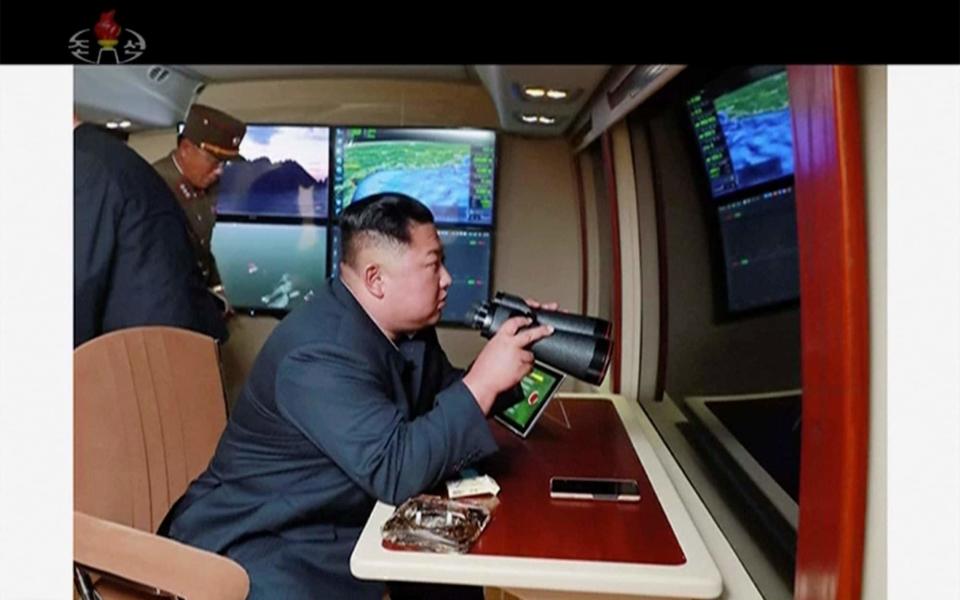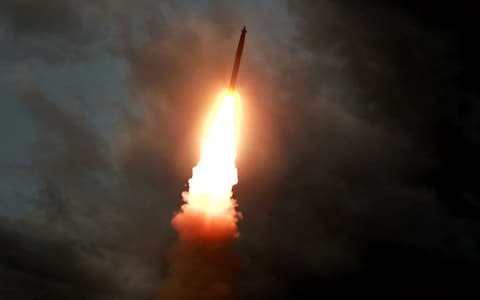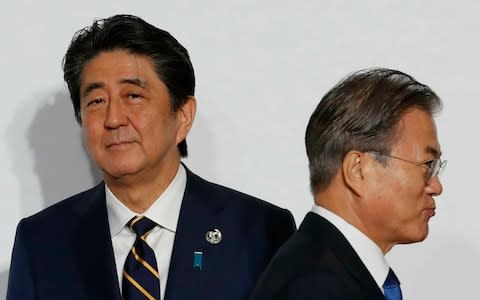North Korea launches new missiles, as rift between South Korea and Japan widens

North Korea launched new short-range ballistic missiles in the early hours of Friday, in its third weapons test in just ten days amid rising frustration over stalled nuclear talks and an upcoming joint military drill between South Korea and the US.
According to South Korea’s Joint Chiefs of Staff, the missiles flew 135 miles and reached an altitude of 15 miles after being fired into the East Sea at 2.59am and 3.23am from Yonghung, South Hamgyong Province.
Donald Trump. the US president, followed his current playbook of dismissing the significance of the missile tests. They were “short-range missiles,” Mr Trump said. “We never made an agreement on that. I have no problem. We’ll see what happens. But these are short range missiles. They are very standard.”
The comments by Mr Trump, who wants to reach a deal over the dismantlement of North Korea’s nuclear weapons programme before the US presidential elections, came shortly after a joint statement by the UK, France and Germany underlining their concern about recent ballistic missile tests.
“We reiterate our condemnation of such launches, which are violations of UN Security Council Resolutions,” said the statement, urging Pyongyang “to engage in meaningful negotiations with the US as agreed between President Trump and Kim Jong Un on 30 June.”

The barrage of North Korean tests follows a historic meeting between Kim and Mr Trump at the end of June on the border between North and South Korea, when they pledged to reignite stalled talks on the denuclearisation of the Korean Peninsula.
Pyongyang has since been riled by plans by Washington and Seoul to go ahead with a joint military exercise later this month, which it considers to be a “rehearsal for war.”
The timing of the tests coincide with the attendance of Mike Pompeo, the US secretary of state, at the annual Association of Southeast Asian Nations forum in Bangkok, Thailand.
Mr Pompeo said on Thursday that he and Stephen Biegun, the US envoy on North Korea, had hoped to meet with a senior North Korean official in the margins of the event, but that the meeting had not materialised.
“We stand ready to continue our diplomatic conversation with the North Koreans,” Pompeo told reporters at a joint news conference with the Thai foreign minister. “I regret that it looks like I’m not going to have the opportunity to do that while I’m here in Bangkok, but we’re ready to go.”
Japan said on Friday that the new launch presented no immediate impact on its national security.

However, Tokyo opened a new diplomatic battlefront with South Korea by striking it off its “white list” of 27 countries with preferential trade status, a move that will fuel bilateral tensions that began last year over a dispute about World War II reparations.
The decision means that South Korea will be stripped later this month of the privileged status that has allowed it to access Japanese goods without cumbersome red tape, reported the Nikkei Asian Review.
Hiroshige Seko, Japan's minister of economy, trade and industry, denied it was an export ban and said the move would simply put South Korea on a par with other Asian economies such as Taiwan.
However, Moon Jae-in, the South Korean president, is holding a special cabinet meeting on the issue on Friday and Ko Ming-jung, a government spokesperson warned that Seoul will “sternly respond” to the “unfair decision."
South Korea had previously warned that it may reconsider intelligence cooperation with Japan if the diplomatic spat escalates.
Relations between the two nations have deteriorated since a South Korean Supreme Court decision last year to award reparations to the country’s wartime labourers at Japanese companies during Japan’s colonial rule, which lasted from 1910 to 1945.
Tokyo considers the issue to have been settled under a 1965 agreement and fears the court ruling could open the floodgates for multiple compensation claims.

